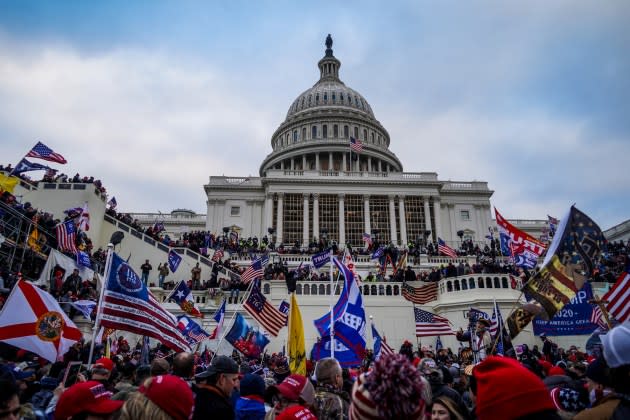Supreme Court Says DOJ Overstepped With Jan. 6 Obstruction Charges

The Supreme Court ruled on Friday that the Justice Department overstepped in charging hundreds of Jan. 6 rioters with the crime of “obstruction of an official proceeding.” The decision could force prosecutors to reconsider some of its pending cases against rioters.
In a ideologically mixed 6-3 vote, the court ruled in Fischer v. United States that the Justice Department needs to raise the burden of proof for such charges, with prosecutors needing to demonstrate defendants were actually trying to disrupt the Electoral College count, not just enter the Capitol.
“Nothing in the text or statutory history suggests that (the law) is designed to impose up to 20 years’ imprisonment on essentially all defendants who commit obstruction of justice in any way and who might be subject to lesser penalties under more specific obstruction statutes,” Chief Justice John Robetts wrote in the majority opinion. Liberal Justice Ketanji Brown Jackson joined the majority, while conservative Justice Amy Coney Barrett joined the other two liberals in dissenting.
It’s unclear how the decision will affect the Justice Department’s prosecution of Donald Trump for obstructing an official proceeding, although as Politico points out, Special Counsel Jack Smith has argued that Trump is guilty of the charge even under its most narrow reading.
The Justice Department responded soon after the court handed down the decision.
“January 6 was an unprecedented attack on the cornerstone of our system of government — the peaceful transfer of power from one administration to the next,” Attorney General Merrick Garland wrote in a statement. “I am disappointed by today’s decision, which limits an important federal statute that the Department has sought to use to ensure that those most responsible for that attack face appropriate consequences.
The Justice Department issued the following statement from Attorney General Merrick B. Garland on the Supreme Court’s decision in Fischer v. United States
🔗: https://t.co/VpQleUTKPa pic.twitter.com/mlABwQG71Z— U.S. Department of Justice (@TheJusticeDept) June 28, 2024
Trump also responded, on Truth Social. “BIG WIN!!” he wrote.
Joseph Fischer, a participant in the Jan. 6 storming of the Capitol, was charged with obstruction of an official proceeding, assaulting a police officer, and disorderly conduct. In March 2022, Trump-appointed D.C. District Court Judge Carl Nichols dismissed the obstruction charges against Fischer and two other Jan. 6 defendants. Nichols argued that the 2002 Sarbanes-Oxley Act, through which the crime was first defined, had been incorrectly interpreted and applied by the Justice Department. The D.C. Court of Appeals later reversed the ruling, leading to its escalation to the Supreme Court.
Last August, the Justice Department charged Trump with obstructing an official proceeding, as well as conspiracy to obstruct an official proceeding and conspiracy to defraud the United States. The charges relate to Trump’s efforts to undermine his 2020 election loss to President Joe Biden, and his role in fomenting the riot that stormed the Capitol on Jan. 6.
The court is also considering whether Trump is immune from prosecution for actions taken while he was still in office. If they rule he was, it would sink the Justice Department’s case against him. The court is expected to hand down its decision on Monday.
More from Rolling Stone
Supreme Court Allows Politicians to Criminalize Homelessness
Trump Tries to Blame Nancy Pelosi for Jan. 6 in Lie-Heavy Debate
Best of Rolling Stone

